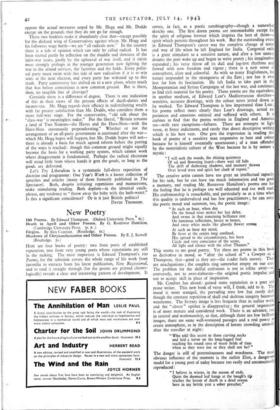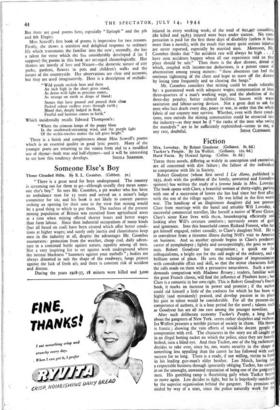New Poetry ,
Death in April and Other Poems. By G. Rostrevor Hamilton. (Cambridge University Press. 33. 6 .)
Elegies. By Alex Comfort. (Routledge. 55.) , Shadows of Chrysanthemums and Other Poems. By E. J. Scovell (Routledge. is.) HERE are four books of poetry: two from poets of established reputation, two from very young poets whose reputations are still in the making. The most important is Edward Thompson's zoo Poems, for the selection covers the whole range of his work from juvenilia to extracts from his latest publication, New Recessional, and to read it straight through (for the poems are printed chrono- logically) reveals a clear and interesting pattern of development. It serves, in fact, as a poetic autobiography—though a somewhat sketchy one. The first dozen poems are unremarkable except for the spirit of religious fervour which inspires the best of them—a spirit which persists throughout his work. But the outstanding event in Edward Thompson's career was the complete change of scene and way of life when he left England for India. Congenial exile is a great stimulant to a sensitive nature, and after a few uneasy dreams the poet woke up and began to write poetry ; his imagination expanded ; his verse threw off its dull and jog-trot rhythms and flowed with new freedom and vigour ; there is a new sense of atmosphere, alien and colourful. As with so many Englishmen, his nature responded to the strangeness of the East ; nor has it ever lost for him its fascination. He left India to take part in db.: Mesopotamian and Syrian Campaigns of the last war, and continued to find rich material for his poetry. These poems are the equivalent, in another medium, of Edward Lear's Mediterranean sketches— sensitive, accurate drawings, with the colour notes jotted down as he worked. Yet Edward Thompson is less impersonal than Lear; his poems reflect more clearly than Lear's drawings, actual ex- periences and emotions enjoyed and suffered with others. It is curious to find that the poems written in England and America are—with rare exceptions—failures. There are attempts at light verse, at fierce indictment, and rarely that direct descriptive writing which is his best vein. One gets the impression in reading this book of poems of a sensitive man responsive to heat and colour because he is himself essentially unsensuous ; of a man offended by the materialistic culture of the West because he is by nature a mystic: "I will seek the woods, the shining quietness
Of sal and flowering laurel—there wait till falls The drift of darkening shadows, and memory throws
Over loved trees and spirit her cloak- of repose."
The creative artist cannot have too great an intellectual capacity for his task, but he can have too much information and too good a memory, and reading Mr. Rostrevor Hamilton's poems one has the feeling that he is perhaps too well educated and too well read His craftsmanship is remarkable, and particularly so at a time when this quality is undervalued and has few practitioners ; he can enter the poetic mood and summon, too, the poetic image: "At such an hour, when day
On the broad river makes her last delay, And swans in that remaining brilliance rest On luminous reflections, breast to breast, And sway white necks like ghostly flower stems{ At such an hour my mind, By fever at the centre long confined, Has spread to the circumference has been . Circle and very conscience of the scene, All light and silence with the silver Thames." •
Thils seems to me good poetry. Yet there are poems in this book so derivative in mood, so "after the school of" a Cowper. or a Thompson, that—good as they are—the reader feels uneasy. They are anachkonisms ; the couplets ring somewhat empty on our ears. The problem for the skilful craftsman is not to refine away—or, conversely, not to over-elaborate—the original poetic impulse; and not to accept skill in place of inspiration. Mr. Comfort has ahead/ gained some reputation as a poet and prose writer. This new book of verse will, I think, add to it. The mood is more tranquil, the pervading tone low . but .rarely dull, though the constant repetition of skull and skeleton imagery becomes wearisome. The literary image is less frequent than in earlier Work, and the " clever " epithet is disappearing ; the general impression is of more mature and considered work. There is an advance, too, in control and workmanship, so that, although there are few brilliant images, there are some well-sustained passages and a real power to create atmosphere, as in the description of horses crowding uneasily after the traveller at night: "Who told this secret to those curving necks and laid a terror on the long-legged foal teaching his round eyes of waste fields of time when as they were not so they shall not be?"
The danger is still of pretentiousness and wordiness. The most obvious influence of the moment is the earlier Eliot, a dangerous model for a young poet of today because too easily and unconsciowl! reproduced: "I believe in winter, in the season of ends. Quiet the doomed leaf hangs at the bough's tip teaches the lesson of death in a dead season here in my brittle year a sober preacher."
But there are good poems here, especially " Epitaph " and the 5th and 6th Elegies.
Miss Scovell's first book of poems is impressive for two reasons. Firstly, she shows a sensitive and delighted response to ordinary life which transmutes the familiar into the new ; secondly, she has a talent for verse which she has considerably developed if (as I suppose) the poems in this book are arranged chronologically. Her themes are mostly of love and Nature—the domestic nature of city parks, gardens, flowers in pots and children's walks and the nature of the countryside. Her observations are clear and accurate, but they are used imaginatively. Here is a description of orchids:
"Wild purple orchids here and there
An inch high in the short grass stood, As dense with light as precious stones, As strange on earth as drops of blood :
Stones that have poured and poured their close
Packed colour endless years through earth ; Blood that, deeply lodged in flesh, Fearful and lustrous comes to birth."
Which incidentally recalls Edward Thompson's: "Where the crimson lamps of the poppy blaze In the southward-streaming wind, and the purple light Of the orchis-torches makes the tall grass bright."
There is a finish and completeness about Miss Scovell's poems which is an essential quality in good lyric poetry. Many of the younger poets are returning to the stanza form and to a modified use of rhyme—both true and half-rhymes—and it will be interesting
to see how this tendency develops. SHEILA SHANNON.



























 Previous page
Previous page